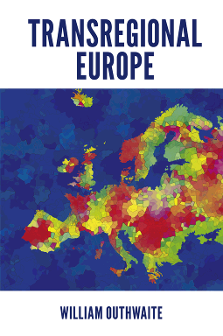
Prelims
ISBN: 978-1-78769-494-1, eISBN: 978-1-78769-493-4
Publication date: 13 April 2020
Citation
Outhwaite, W. (2020), "Prelims", Transregional Europe, Emerald Publishing Limited, Leeds, pp. i-xi. https://doi.org/10.1108/978-1-78769-493-420201011
Publisher
:Emerald Publishing Limited
Copyright © 2020 William Outhwaite
Half Title Page
Transregional Europe
Title Page
Transregional Europe
By
William Outhwaite
Emeritus Professor of Sociology, Newcastle University, UK

United Kingdom – North America – Japan – India – Malaysia – China
Copyright Page
Emerald Publishing Limited
Howard House, Wagon Lane, Bingley BD16 1WA, UK
First edition 2020
© 2020 William Outhwaite
Published under exclusive licence by Emerald Publishing Limited
Reprints and permissions service
Contact: permissions@emeraldinsight.com
No part of this book may be reproduced, stored in a retrieval system, transmitted in any form or by any means electronic, mechanical, photocopying, recording or otherwise without either the prior written permission of the publisher or a licence permitting restricted copying issued in the UK by The Copyright Licensing Agency and in the USA by The Copyright Clearance Center. Any opinions expressed in the chapters are those of the authors. Whilst Emerald makes every effort to ensure the quality and accuracy of its content, Emerald makes no representation implied or otherwise, as to the chapters' suitability and application and disclaims any warranties, express or implied, to their use.
British Library Cataloguing in Publication Data
A catalogue record for this book is available from the British Library
ISBN: 978-1-78769-494-1 (Print)
ISBN: 978-1-78769-493-4 (Online)
ISBN: 978-1-78769-495-8 (Epub)


About the Author
William Outhwaite, Fellow of the Academy of Social Sciences, UK, taught at the universities of Sussex, in the School of European Studies, and Newcastle, where he is Emeritus Professor of Sociology. His interests include the philosophy of the social sciences (especially realism), social theory (especially critical theory), political sociology and the sociology of knowledge.
Professor Outhwaite is now working mainly on contemporary Europe. He is the author of Understanding Social Life: The Method Called Verstehen (1975, 2nd edn. 1986), Concept Formation in Social Science (1983), New Philosophies of Social Science: Realism, Hermeneutics and Critical Theory (1987), Jürgen Habermas: A Critical Introduction (1994), The Future of Society (2006), European Society (2008), Critical Theory and Contemporary Europe (2012), Social Theory (2015), Europe since 1989: Transitions and Transformations (2016), Contemporary Europe (2017) and (with Larry Ray) Social Theory and Postcommunism (2005). He edited The Habermas Reader (1996), Brexit: Sociological Responses (2017), (with Tom Bottomore) The Blackwell Dictionary of Twentieth-Century Social Thought (1993, 2nd edn. 2004), (with Luke Martell) The Sociology of Politics (1998), and (with Stephen P. Turner) the Sage Handbook of Social Science Methodology (2007) and Sage Handbook of Political Sociology (2018) and (with Luca Corchia and Stefan Müller-Doohm) Habermas global: Wirkungsgeschichte eines Werks (2019).
Preface
This book continues a line of argument developed in my European Society (2008), Europe Since 1989 (2016) and Contemporary Europe (2017). It aims to integrate work such as ‘new regionalist’ approaches in human geography and planning with related scholarship in history and the other social sciences. At the time of writing, the future of the UK and its relationship with the European Union (EU) still remains open, but it is possible to make two remarks here. First, there is no obstacle in principle to non-member states participating in EU programmes of the kind discussed here. Second, however, when the UK does secede, on whatever terms, it will probably cease to appear in many of the statistical sources on which writers on contemporary Europe have increasingly relied. 1 This is a further source of regret amidst a much broader tragedy. The EU will survive (and hopefully thrive) without the UK, though it is hard to see any future for the UK or whatever remains of it after its probable dissolution.
Acknowledgements
My thanks to Bob Jessop and Krishan Kumar for providing copies of papers. I have also benefited from conversations with a number of other friends and colleagues, in particular Gerard Delanty, who read the book in manuscript.
For an early example of this exclusion, see the Commission proposal for Cohesion Policy in the 2021–2027 budget period: http://ec.europa.eu/regional_policy/sources/docgener/panorama/pdf/mag65/mag65_en.pdf. The ESPON reports and maps referred to substantially in this book include only the European Economic Area and Switzerland.
- Prelims
- Chapter 1 Introduction
- Chapter 2 Europe Imagined: Regions and States
- Chapter 3 Seeing Europe in Time and Space
- Chapter 4 Regions an sich: Natural, Linguistic, Religious
- Chapter 5 Planning for EUrope
- Chapter 6 Eurasia: Complement or Competitor?
- Chapter 7 Migrants and Tourists
- Chapter 8 Whither Europe? Planned and Unplanned Macro-regions
- Endnotes
- References
- Index